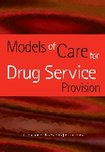Richard Bryant-Jefferies
Counselling, Psychotherapy and Coaching Author, Consultant in Equalities and Diversity, Counselling and Self-Awareness Trainer
Providing an accessible introduction to the national framework for drug services and incorporating a dialogue style narrative taking a drug using client through a range of treatments from the point of waking out of an overdose-induced coma in hospital, through care co-ordination, prescribed substitute medication, counselling, day programme, community detoxification. It takes the Government's 'Models of Care' document and places it is a human context of the drug user and the team working to help them reduce their drug use and the associated harm. A must read title for all working with drug using clients, or who are involved in the commissioning or managing of drug services.
‘Drug problems affect us all, directly or indirectly. Perhaps a family member has or has had a drug problem. Maybe we have ourselves. Or it could be that we have been burgled by someone needing goods to sell on for a fix or two. But even if we have not been affected directly in this way, we are indirectly affected by the simple fact of our taxes being spent on drug treatment programmes, on the health and social care effects of drug use, and on criminal justice responses to illicit use. Drug use impacts on us all, to a greater or lesser extent.
At the time of writing, drug and alcohol services are in the process of preparing for implementing the National Treatment Agency’s ‘Models of Care’ system … composed of 5 elements: A four-tiered framework for drug and alcohol treatment services, Integrated care pathways, Assessment within a tiered system, Care planning and care co-ordination, Monitoring…. In writing this book I hope to contribute not only to the process of implementation, but also to stimulate thought and discussion around what it means to provide more ‘client-’ rather than ‘treatment-centred’ drug services.’
From the author’s Introduction
‘“Models of Care” is a reference book. It is an encyclopaedia of what constitutes good care for drug treatment. But it is dry and difficult to digest. As one of the authors, I am at liberty to admit this fact. That is what makes Models of Care for Drug Service Provision, by Richard Bryant-Jefferies so fascinating and useful. It breathes life into a rather dull and abstract subject. Though the life of Mark, a fictitious drug user, and a range of professionals he comes into contact with over a three-month period, you get to experience drug treatment through the eyes of the service user.
It is not always a smooth ride in this process called treatment. It is full of bumps and U-turns along the way. The fictitious journey Mark takes rings true to my 20 plus years of working in this field and watching numerous clients, like Mark, start down this road.
This book is a wonderful reminder that we are dealing first and foremost with human beings who are complex, vulnerable and who also happen to have a drug problem. Our treatment professionals need to be well informed, up to date and responsive to the needs of clients like Mark. They also need to be understanding, tolerant and resourceful. Models of Care assists them by providing a framework within which to work and by helping to bind together the range of professionals and services into a system of care.’
Don Lavoie, Deputy Regional Manager for London, National Treatment Agency, From his Foreword
Models of Care for Drug Service Provision also includes reflections from Dr William Shanahan (Consultant Psychiatrist), Caroline Frayne (Nurse Consultant) and the Family Therapy Team at Substance Misuse Service, Central and North West London NHS Foundation Trust.
Purchase direct from the author (see contact details), from the publisher - Routledge, or all on-line booksellers.
MODELS OF CARE FOR DRUG SERVICE PROVISION
Richard Bryant-Jefferies
IISBN 1 85775 615 0
Books published
Counselling the Person Beyond the Alcohol Problem
Living Therapy series
Problem Drinking
Couselling for Problem Gambling
Counselling for Eating Disorders in Women
Counselling for Eating Disorders in Men
Counselling Young People
Relationship Counselling: Sons and their Mothers
Responding to a Serious Mental Health Problem
Counselling for Progressive Disability
Counselling a Recovering Drug User
Counselling a Survivor of Childood Sexual Abuse
Counselling Victions of Warfare
Counselling for Obesity
Counselling Young Binge Drinkers
Counselling for Death and Dying
Time-limited Therapy in Primary Care
Workplace Counselling in the NHS
Person-centred Counselling Supervision
Models of Care for Drug Service Provision
A Little Book of Therapy
Novels
Binge!
Alive and Cutting
The Jigsaw of Life
The Sevenfold Circle: Self Awareness in Dance (with Lynn Frances)
